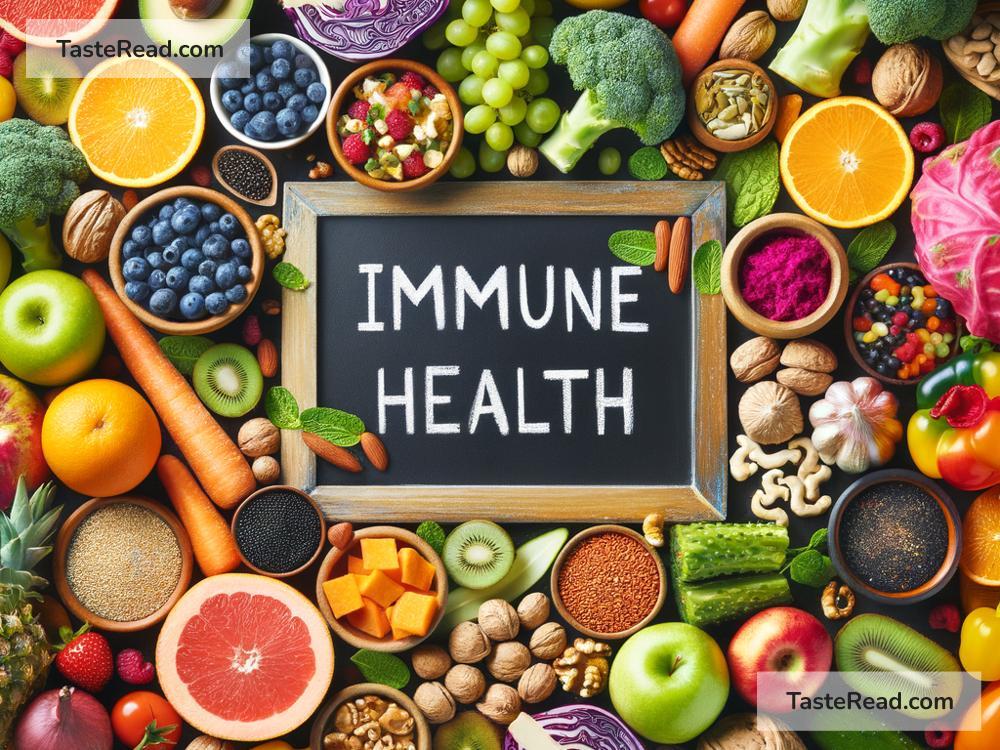The Role of Nutrition in Supporting Immune Health
Our immune system is like a superhero inside our bodies, protecting us from harmful invaders like bacteria, viruses, and other pathogens. To do its job well, the immune system needs the right support—and proper nutrition plays a huge role in keeping it strong and active. Think of food as fuel for our immune system. The better the fuel we provide, the better our immune system can protect us.
In this blog, we’ll explore how nutrition supports immune health and which foods can help you stay healthy.
Why Nutrition Is Important for Immune Health
The immune system is a complex network of cells, tissues, and organs that work together to fight off illness. To function optimally, it needs essential vitamins, minerals, and other nutrients. These nutrients act as building blocks that help immune cells grow and function properly.
Without the right nutrition, the immune system can become weak and struggle to fend off infections. This is why eating a balanced diet is so important—not only for overall health but also for keeping your immune system strong.
Key Nutrients for Immune Health
Certain nutrients have been proven to directly support the immune system. Let’s take a closer look at some of the most important ones:
1. Vitamin C
Vitamin C is one of the most well-known nutrients for boosting immunity. It helps the body produce white blood cells, which are essential for fighting infections. It also acts as an antioxidant, protecting cells from damage caused by harmful molecules called free radicals.
Foods rich in vitamin C include oranges, lemons, strawberries, kiwi, bell peppers, and broccoli.
2. Vitamin D
Vitamin D is crucial for regulating the immune system. It helps activate immune cells to respond to infections and reduces inflammation. A lack of Vitamin D has been linked to an increased risk of colds, flu, and other illnesses.
You can get vitamin D from sunlight, fortified foods (like milk and cereals), egg yolks, and fatty fish such as salmon.
3. Zinc
Zinc is a mineral that supports the function of immune cells and helps the body heal wounds. It plays a key role in defending against viruses and bacteria. Without enough zinc, immune cells might not work as effectively.
Foods rich in zinc include nuts, seeds, beans, lentils, meat, shellfish, and whole grains.
4. Probiotics
Probiotics are healthy bacteria that live in the gut. They play an important role in maintaining a balanced immune system. A large portion of the immune system is located in the gut, so keeping it healthy is essential.
Probiotic-rich foods include yogurt, kefir, sauerkraut, kimchi, and other fermented foods.
5. Protein
Protein is important for building and repairing tissues, including those in the immune system. Proteins are made of amino acids, which help create antibodies that fight off infections.
Good sources of protein include lean meats, eggs, fish, tofu, beans, nuts, and dairy products.
6. Antioxidants
Antioxidants protect the body from oxidative stress, which can weaken the immune system. These nutrients include vitamins A and E and compounds found in colorful fruits and vegetables.
Eat plenty of carrots, sweet potatoes, spinach, blueberries, and nuts to boost your antioxidant levels.
Foods to Include for Strong Immunity
To support your immune system, focus on eating a variety of whole, nutrient-rich foods. Here are some ideas to include in your daily meals:
- Fruits and Vegetables: Aim for a rainbow of colors! They are rich in vitamins, minerals, and antioxidants that boost immunity.
- Whole Grains: Provide energy and support gut health.
- Lean Proteins: These help repair and maintain immune tissues.
- Healthy Fats: Include nuts, seeds, and avocado to support overall health.
- Fermented Foods: These promote a healthy gut, which is important for immunity.
Foods to Avoid
While some foods support your immune system, others can weaken it. Limit the following:
- Sugary Foods: High sugar levels can reduce the effectiveness of immune cells.
- Processed Foods: These often lack key nutrients and may contain harmful additives.
- Excessive Alcohol: Too much alcohol can impair the immune system.
Hydration Matters, Too
Don’t forget to drink enough water! Staying hydrated helps your body flush out toxins and supports overall health. Water is also needed for carrying nutrients to your cells, including those in the immune system.
Lifestyle Choices That Support Immunity
While nutrition is crucial, it’s not the only factor that determines immune health. Other lifestyle choices can also make a big difference:
- Get Enough Sleep: Poor sleep can weaken your immune system.
- Exercise Regularly: Physical activity helps immune cells circulate more effectively.
- Reduce Stress: Chronic stress can suppress immune function.
- Wash Your Hands: Preventing infections is just as important as fighting them.
Conclusion
Nutrition is a powerful tool for supporting your immune system and protecting your health. By eating a balanced diet filled with fruits, vegetables, lean protein, and healthy fats, you provide your immune system with the resources it needs to function properly. Pair good nutrition with a healthy lifestyle, including regular exercise, stress management, and plenty of sleep.
Remember, small changes in your diet can lead to big improvements in your immune health. So the next time you plan a meal, think about giving your immune system the boost it deserves!


